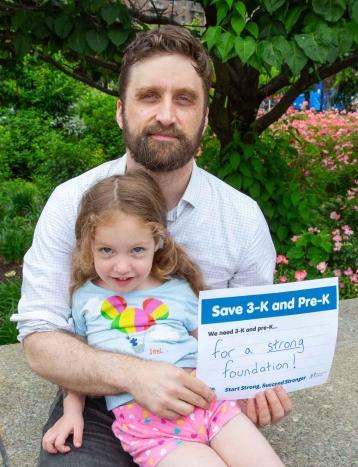
Ben Lowe sits in front of the main branch of the Brooklyn Public Library with his 3-year-old daughter, who was waitlisted for a seat in a 3-K classroom.
“If this doesn’t somehow magically resolve itself, Disney-movie style, it will be really hard for us,” said Ben Lowe, the Brooklyn father of a 3-year-old and a member of New Yorkers United for Child Care. Lowe’s family is one of 2,400 families whose children did not get placed in a public 3-K program for the 2024–25 school year.
Mayor Eric Adams had promised that every family who wanted a spot for their child would receive one. City Hall said there were 9,000 slots available citywide, but it did not reveal the location of those placements.
“Families are now scrambling for child care solutions, and these children will be at an academic disadvantage without the vital foundation that universal pre-K and 3-K provide,” said UFT Vice President for Elementary Schools Karen Alford.
The Adams administration has withdrawn support from the city’s early childhood education programs, which had become among the strongest in the nation under Bill de Blasio, his predecessor. In his executive budget in April, the mayor failed to restore $170 million in midyear cuts he made to 3-K and pre-K.
UFT members, together with parents, are determined to fight back. The union launched a #StartStrong campaign on April 6 at its Early Childhood Conference, where the 400 attendees filled out postcards explaining why 3-K and pre-K matter. Their reasons included “to grow strong minds and build creative hearts,” “for children to learn how to collaborate with each other and practice a structured day,” and “because my 3-year-old has gone from 100 words in September to more than 1,000 in April — he has a speech delay.”
“Our children deserve a strong start, so they can have a stronger finish,” said Alford, who is spearheading the campaign.
Since then, UFT members and public school families have sent more than 44,000 emails to the mayor, the schools chancellor and members of the Panel for Educational Policy to demand that they restore funding for 3-K and pre-K seats in the city budget, be responsive to demand by assigning 3-K and pre-K seats to neighborhoods where they’re needed, and invest in marketing so that families know that early childhood education is available and how to apply.
“The demand is very real,” said Lowe. Anyone claiming there’s low need for 3-K and pre-K in New York City, he said, should “explain that to the 49 people” ahead of his daughter on the waitlist for their top-ranked program.
Kathleen Castillo, the UFT chapter leader and a pre-K teacher at Learning Through Play in the South Bronx, was “elated” when the DOE, during de Blasio’s time in office, established universal pre-K and started expanding 3-K.
Castillo said these programs are particularly necessary for students with behavioral and learning disabilities so they may be diagnosed at an early age and get the support they need.
“The whole point of putting these programs in place was so children could start their education earlier,” she said. “If we take it away, we’re not valuing the education that happens at that early age,” she said.
Alford said the evidence is clear about how effective early childhood education is to set children up for success in school and life.
“We know the importance of socialization,” she said. “We know about cognitive development. And we know that families, primarily women, are able to enter or re-enter the workplace because of 3-K and pre-K.”
